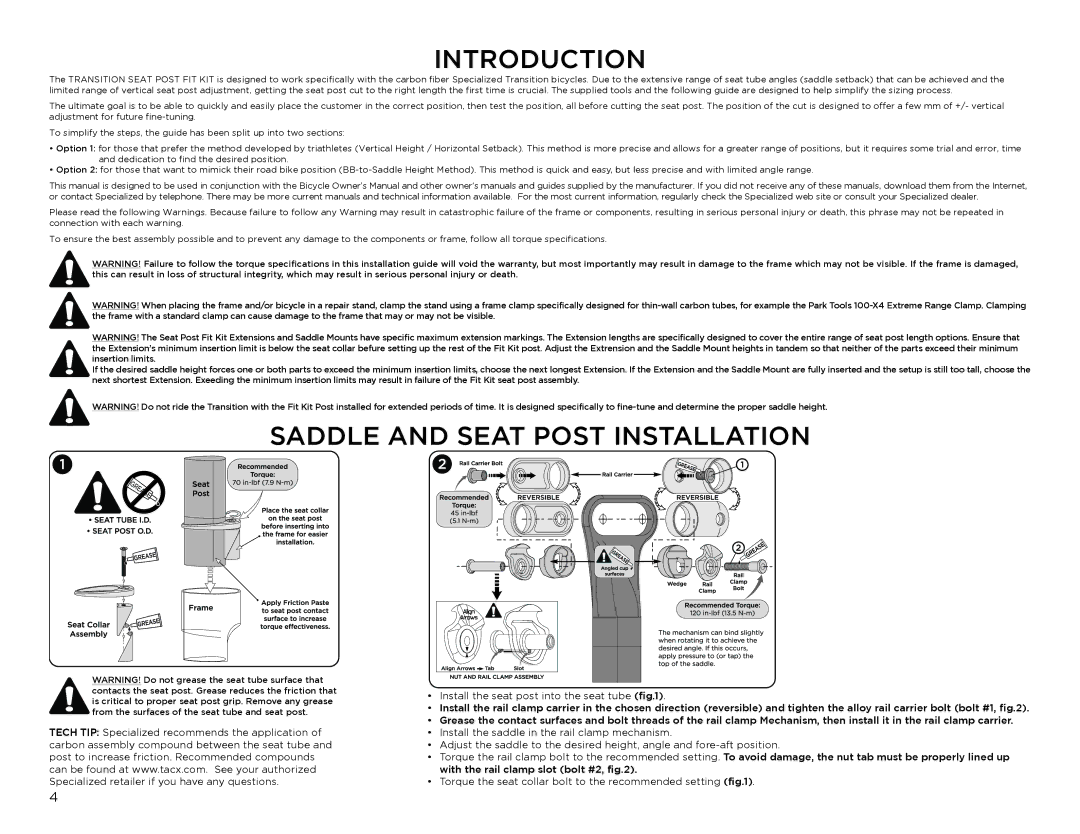
INTRODUCTION
The TRANSITION SEAT POST FIT KIT is designed to work specifically with the carbon fiber Specialized Transition bicycles. Due to the extensive range of seat tube angles (saddle setback) that can be achieved and the limited range of vertical seat post adjustment, getting the seat post cut to the right length the first time is crucial. The supplied tools and the following guide are designed to help simplify the sizing process.
The ultimate goal is to be able to quickly and easily place the customer in the correct position, then test the position, all before cutting the seat post. The position of the cut is designed to offer a few mm of +/- vertical adjustment for future
To simplify the steps, the guide has been split up into two sections:
•Option 1: for those that prefer the method developed by triathletes (Vertical Height / Horizontal Setback). This method is more precise and allows for a greater range of positions, but it requires some trial and error, time and dedication to find the desired position.
•Option 2: for those that want to mimick their road bike position
This manual is designed to be used in conjunction with the Bicycle Owner’s Manual and other owner’s manuals and guides supplied by the manufacturer. If you did not receive any of these manuals, download them from the Internet, or contact Specialized by telephone. There may be more current manuals and technical information available. For the most current information, regularly check the Specialized web site or consult your Specialized dealer.
Please read the following Warnings. Because failure to follow any Warning may result in catastrophic failure of the frame or components, resulting in serious personal injury or death, this phrase may not be repeated in connection with each warning.
To ensure the best assembly possible and to prevent any damage to the components or frame, follow all torque specifications.
WARNING! Failure to follow the torque specifications in this installation guide will void the warranty, but most importantly may result in damage to the frame which may not be visible. If the frame is damaged, this can result in loss of structural integrity, which may result in serious personal injury or death.
WARNING! When placing the frame and/or bicycle in a repair stand, clamp the stand using a frame clamp specifically designed for
WARNING! The Seat Post Fit Kit Extensions and Saddle Mounts have specific maximum extension markings. The Extension lengths are specifically designed to cover the entire range of seat post length options. Ensure that the Extension’s minimum insertion limit is below the seat collar befure setting up the rest of the Fit Kit post. Adjust the Extrension and the Saddle Mount heights in tandem so that neither of the parts exceed their minimum insertion limits.
If the desired saddle height forces one or both parts to exceed the minimum insertion limits, choose the next longest Extension. If the Extension and the Saddle Mount are fully inserted and the setup is still too tall, choose the next shortest Extension. Exeeding the minimum insertion limits may result in failure of the Fit Kit seat post assembly.
WARNING! Do not ride the Transition with the Fit Kit Post installed for extended periods of time. It is designed specifically to
SADDLE AND SEAT POST INSTALLATION
WARNING! Do not grease the seat tube surface that contacts the seat post. Grease reduces the friction that is critical to proper seat post grip. Remove any grease from the surfaces of the seat tube and seat post.
TECH TIP: Specialized recommends the application of carbon assembly compound between the seat tube and post to increase friction. Recommended compounds can be found at www.tacx.com. See your authorized Specialized retailer if you have any questions.
•Install the seat post into the seat tube (fig.1).
•Install the rail clamp carrier in the chosen direction (reversible) and tighten the alloy rail carrier bolt (bolt #1, fig.2).
•Grease the contact surfaces and bolt threads of the rail clamp Mechanism, then install it in the rail clamp carrier.
•Install the saddle in the rail clamp mechanism.
•Adjust the saddle to the desired height, angle and
•Torque the rail clamp bolt to the recommended setting. To avoid damage, the nut tab must be properly lined up with the rail clamp slot (bolt #2, fig.2).
•Torque the seat collar bolt to the recommended setting (fig.1).
